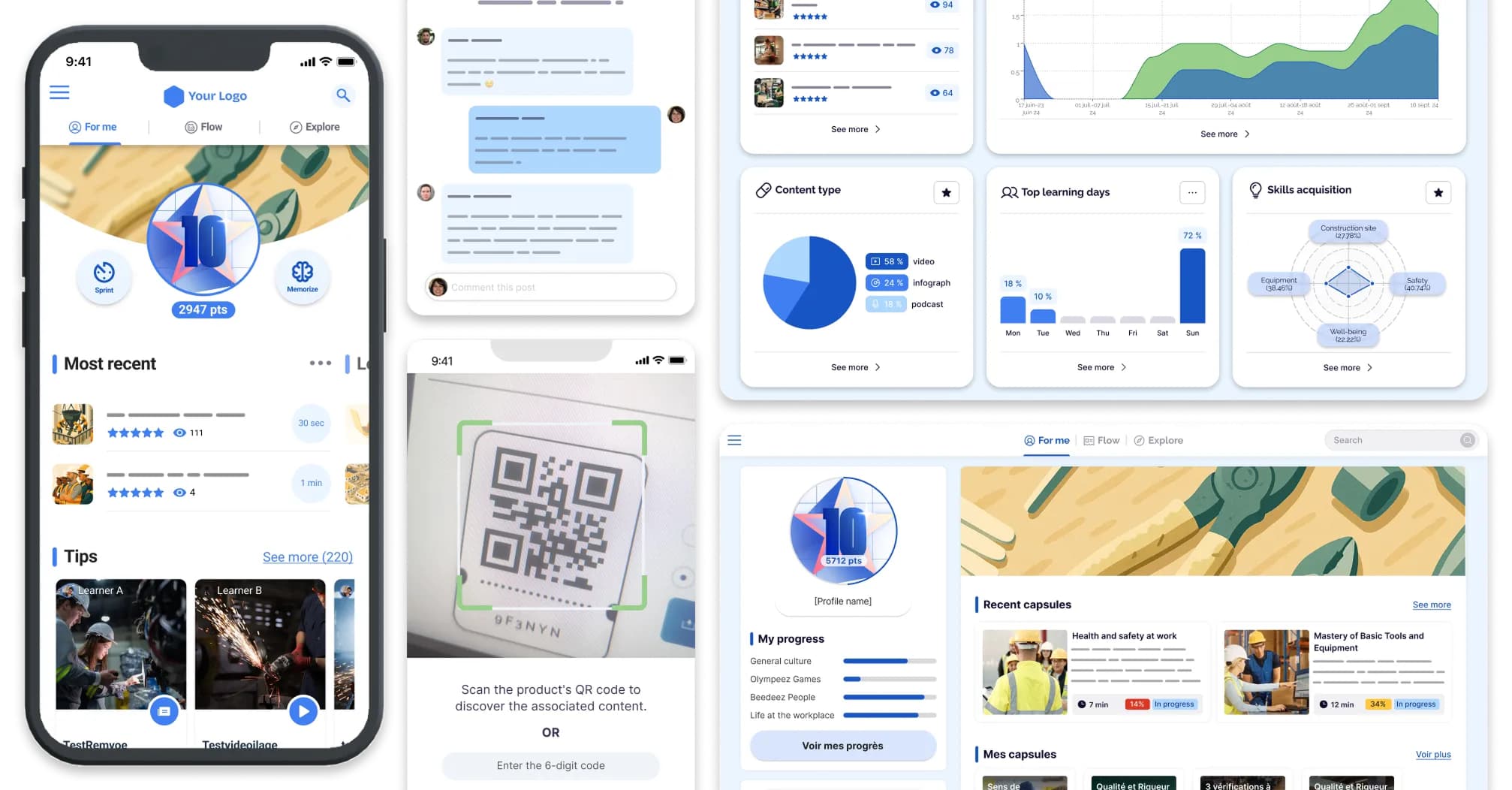Decryption: managerial training can no longer be standardized
Training a manager is not ticking a box or following a generic program. It allows him to progress according to his level, his missions and the situations he experiences on a daily basis. The LMS meets these challenges by combining flexibility, customization and measurable impact.
Managers juggle multiple responsibilities and a chronic lack of time. Moreover, traditional courses are not always adapted to the diversity of profiles and environments.
An LMS allows short formats, applicable immediately, accessible on demand.
- It integrates features like coaching, social learning, and 360 evaluations.
- It also makes it possible to monitor the evolution of skills and to measure their impact on teams.
→ Result: better integrated, more engaging and more effective training to support managers over the long term.
The challenges of increasing managerial skills
Being a manager cannot be improvised. However, many access this role without real preparation for a promotion, for example, and must juggle varied responsibilities and ever stronger requirements. Here are the main obstacles to a effective skills development.
Shortly available time: Managers are often overwhelmed with work with long to-do lists. Between the objectives to be followed, daily emergencies, meetings and requests from the field, training comes last. However, it is in these moments of tension that managerial skills make all the difference.
Varied, demanding and often contradictory roles: A manager is no longer content with directing or commanding, the methods of”Top Down” are now over. He must listen, motivate, pilot, coordinate, referee, coach. It is a multi-faceted job that requires transversal skills: technical, human, strategic.
Inappropriate training courses: Too general, too theoretical, often disconnected from everyday life, classical managerial training does not always meet concrete needs. This lack of alignment leads to frustration, and sometimes disengagement.
How does an LMS facilitate management training?
Faced with these obstacles, online training platforms offer a concrete response. One LMS makes it possible to adapt learning to the realities of the field, while streamlining access to training. Here is how it is transforming the support of managers.
Courses adapted to the level of maturity: The LMS makes it possible to differentiate content: we do not offer the same support to a manager taking up his first position as to an experienced executive. Everyone progresses at their own pace, according to their challenges and their environment.
Training on demand, with concrete scenarios: With an LMS, managers have access to short, targeted modules that they can activate at any time. An arduous salary negotiation, difficulties managing your team, the stress of having to communicate poor results? Modules lasting 10 to 15 minutes are available on demand, immediately. Learning becomes agile, at the service of action.
Monitoring the impact on the ground: The LMS does more than just deliver content. It makes it possible to measure progress: completion rate, quizzes, self-evaluations... but also HR impact: turnover, general social climate or at a point of sale, commitment. We are moving from a logic of training to a logic of transformation and transmission of knowledge.
The key functions to activate for a really useful LMS
Digital coaching: Integrating coaching modules (asynchronous or by video) into an LMS makes it possible to personalize the support of executive managers or team leaders. Managers are no longer alone: they are guided, stimulated, and challenged by an expert or a peer.
Social learning between peers: Encouraging exchanges between managers is essential. The LMS becomes a platform for exchanges: feedback, best practices, mutual assistance in difficult situations. A manager also learns a lot... from another manager.
Integrated 360 evaluations: The 360 evaluation allows the manager to become aware of his strengths and areas for improvement, thanks to the combined feedback of his team, his peers and his N+1. By integrating it into the LMS, we create a coherent journey, rooted in reality.
Testimonies: these managers who knew how to make the most of the use of their LMS.
Julie, team manager at ISS Services “I managed operational tasks well, but I was having trouble positioning myself as a leader. The modules offered by the LMS allowed me to identify areas of progress. I advanced in small steps, with modules adapted to my current challenges. As a result, my team is more autonomous and more motivated.”
Maxime, senior manager at AXL Logistics “The coaching integrated into the LMS was a revelation. I needed to get out of “firefighter” mode and build a more strategic vision. The sessions helped me to take a step back, and the feedback from my team via the 360 assessment validated my progress.”
Sonia, interim agency manager at PROMAN (Rennes) “What did I like best? Possible exchanges with other agency managers. I felt less alone. We are experiencing the same difficulties, the same doubts, but it is difficult to communicate regularly with our peers... The LMS allowed us to share concrete solutions, without judgment and to move forward more quickly on the company's real projects.”
These key figures and facts you need to know about manager training
Here is a selection of recent data and benchmarks to shed light on the challenges and opportunities around managerial training via LMS:
- 65% managers say they do not feel sufficiently prepared to manage the human challenges of their position. (Source: BPI France, 2023)
- +35% employee engagement observed in teams whose managers have followed a contextualized LMS training.
- 57% traditional managerial training is not applied in the field, due to a lack of simulation or follow-up. (Source: Harvard Business Review)
- 40% of companies that digitize the training of their managers observe a decrease in turnover within 12 months. (Source: LinkedIn Learning, 2023)




